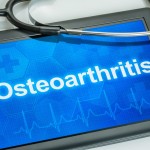
We have reported previously that osteoarthritis is the most common form of arthritis and a leading cause of pain and disability worldwide. It’s symptoms include pain, reduced function and effects on a person’s ability to carry out their activities of daily living. Pain is associated with changes in mood, sleep and coping abilities.
A new quality standard covering the assessment and management of osteoarthritis in adults aged 18 years and over has been recently published by The National Institute for Clinical Excellence (NICE) in the UK.
NICE quality standards describe high-priority areas for quality improvement in a defined care or service area. Each standard consists of a prioritised set of specific, concise and measurable statements. They draw on existing guidance, which provides an underpinning, comprehensive set of recommendations, and are designed to support the measurement of improvement.
This new quality standard does not cover the replacement of hip, knee or shoulder joints in adults with osteoarthritis, because this will be included in a future NICE guideline and quality standard.
The quality standard for osteoarthritis is made up of 8 statements that describe high‑quality care for adults with osteoarthritis. The quality statements are:
- Statement 1. Adults aged 45 or over are diagnosed with osteoarthritis clinically without investigations if they have activity – related joint pain and any morning joint stiffness lasts no longer than 30 minutes.
- Statement 2. Adults newly diagnosed with osteoarthritis have an assessment that includes pain, impact on daily activities and quality of life.
- Statement 3. Adults with osteoarthritis participate in developing a self‑management plan that directs them to any support they may need.
- Statement 4. Adults with osteoarthritis are advised to participate in muscle strengthening and aerobic exercise.
- Statement 5. Adults with osteoarthritis who are overweight or obese are offered support to lose weight.
- Statement 6. Adults with osteoarthritis discuss and agree the timing of their next review with their primary healthcare team.
- Statement 7. Adults with osteoarthritis are supported with non‑surgical core treatments for at least 3 months before any referral for consideration of joint surgery.
- Statement 8. Healthcare professionals do not use scoring tools to identify which adults with osteoarthritis are eligible for referral for consideration of joint surgery.

NICE quality standards help to improve key areas of health or social care so that people are offered the best care available.
The Muscuolskeletal Elf’s view
Because osteoarthritis is the most common form of arthritis and a leading cause of pain and disability worldwide the Muscuolskeletal Elf has published several blogs on recent evidence for people with osteoarthritis including;
- What matters most for early osteoarthritis of the hip and knee?
- Does exercise improve pain and function for osteoarthritis of the knee?
- Risk factors for knee osteoarthritis in older adults
- Painful knee osteoarthritis? What is the effect of platelet-rich plasma injections?
- Exercise type and dose on pain and disability in knee osteoarthritis
- Is exercise effective for osteoarthritis of the hip for pain and function?
- Exercise in water for osteoarthritis of the lower limbs
- Is resistance training beneficial for people with hip or knee osteoarthritis?
- Is electrical stimulation effective for pain relief in OA knee?
- Experiences of the osteoarthritis GP consultation, attitudes and beliefs to OA
- Tai chi improves health related quality of life for people with musculoskeletal conditions
- The burden of musculoskeletal disorders
- Yoga for Musculoskeletal Conditions
- Lifestyle and behaviour change interventions in osteoarthritis and rheumatoid arthritis
- A Hierarchy of Patient-Reported Outcomes for Meta-Analysis of Knee Osteoarthritis Trials
- Is Work Load a Risk Factor for Osteoarthritis of the Hip? A Systematic Review
- Osteoarthritis of the hip or knee and work participation: a systematic review
- Salicylate-containing rubefacients for musculoskeletal pain in adults
- Knee and/or ankle osteoarthritis in former elite soccer players
- Health Literacy in Patients with Chronic Musculoskeletal Disease


Assessment and management of osteoarthritis in adults http://t.co/UyfQVt02HM